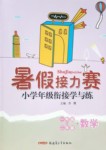题目内容
【题目】Two recent studies have found that punishment is not the best way to influence behavior.
One showed that adults are much more cooperative if they work in a system based on rewards. Researchers at Harvard University in the United States and the Stockholm School of Economics in Sweden did the study.
They had about two hundred college students play a version of the game known as the Prisoner’ s Dilemma. The game is based on the tension between the interests of an individual and a group. The students played in groups of four. Each player could win points for the group, so they would all gain equally. But each player could also reward or punish each of the other three players. Harvard researcher David Rand says the most successful behavior proved to be cooperation. The groups that rewarded it the most earned about twice as much in the game as the groups that rewarded it the least. And the more a group punished itself, the lower its earnings. The study appeared last month in the journal Science.
The other study involved children. It was presented last month in California at a conference on violence and abuse. Researchers used intelligence tests given to two groups. More than eight hundred children were aged two to four the first time they were tested. More than seven hundred children were aged five to nine. The two groups were retested four years later, and the study compared the results with the first test. Both groups contained children whose parents used physical punishment and children whose parents did not.
The study says the IQs of the younger children who were not spanked were five points higher than those who were. In the older group, the difference was almost three points. The more they are spanked, the slower their mental development.
【1】According to the first study, we mainly infer that .
A.the game is called Prisoner’s Dilemma
B.the less a group punished itself, the lower its earnings
C.adults are much more cooperative if rewarded
D.the game is introduced in the journal Science
【2】Which of the following is TRUE according to the second study?
A.Children's IQs have much to do with physical punishment.
B.The study is about violence and cooperation of children.
C.The children tested were divided into groups of four.
D.Children's mental development only relies on their IQs.
【3】What does the underlined word "spanked" refer to?
A. Punished. B. Blamed. C. Tested. D. Praised.
【4】What might be the best title for the text?
A. The Best Way to Correct Misbehavior
B. Punishment Is the Best Way of Education
C. Cooperation Is the Most Successful Behavior
D. Punishment or Reward: Which Works Better on Behavior?
【答案】
【1】C
【2】A
【3】A
【4】D
【解析】
试题分析:文章主要介绍了两项研究的过程和研究成果。近期的两项研究显示,惩罚不是影响行为的最好方法。其中一项研究显示,成年人在一个基于奖励的机制中更具合作性。另一项研究表明,惩罚不利于孩子心智的发展。
【1】C推理判断题。A项太片面;文章没有提到最好的方法,排除B;D项不够具体;根据第二段“One showed that adults are much more cooperative if they work in a system based on rewards.”和第六段“of the younger children who were not spanked were five points higher than those who were”可知,研究表明,奖励能够促进合作,惩罚不利于孩子的心智发展,故选C。
【2】A推理判断题。根据带第六段“who were not spanked were five points higher than those who were”可知,被父母体罚的孩子,他们的智商比没有受到体罚的孩子的低5分,根据最后一段“He says the more they are spanked, the slower their mental development.”可知,孩子受到的惩罚越多,他们的心智发展得越慢。故选A。
【3】A猜测词义题。根据带第六段“who were not spanked were five points higher than those who were”可知,被父母体罚的孩子,他们的智商比没有受到体罚的孩子的低5分,根据最后一段“He says the more they are spanked, the slower their mental development.”可知,孩子受到的惩罚越多,他们的心智发展得越慢,说明划线词是“惩罚”的意思,故选B。
【4】D主旨大意题。B、D两项文中未提及;根据倒数第二段“of the younger children who were not spanked were five points higher than those who were”和最后一段“the more they are spanked, the slower their mental development”可知,惩罚不利于孩子的身心发展,排除C;根据第二段“adults are much more cooperative if they work in a system based on rewards”和第六段“five points higher than those who were”可知,奖励能够促进合作,而惩罚不利于孩子心智的发展,只有A项与奖励有关,故选A。

 桃李文化快乐暑假武汉出版社系列答案
桃李文化快乐暑假武汉出版社系列答案 优秀生快乐假期每一天全新寒假作业本系列答案
优秀生快乐假期每一天全新寒假作业本系列答案 暑假接力赛新疆青少年出版社系列答案
暑假接力赛新疆青少年出版社系列答案